Call Us: (832) 426-4203 | (832) 426-4206
How to File an Insurance Claim for Water Damage
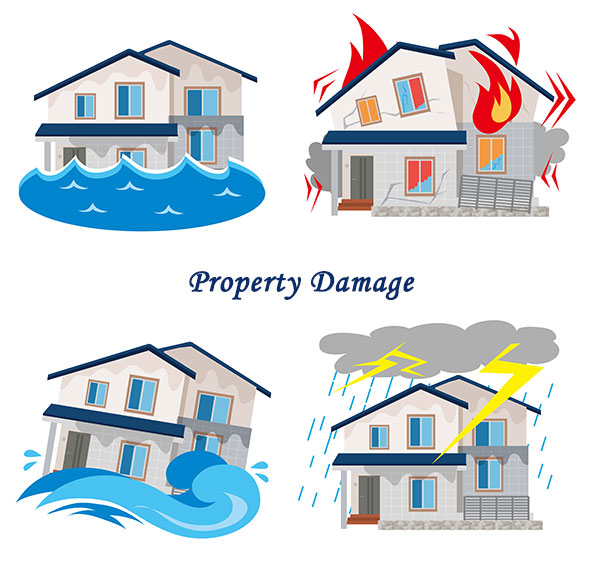
According to the statistics, the most common type of homeowners’ insurance claims are insurance claims for water damage. This comes as no surprise, considering the fact that water damage is the most common type of property damage to occur. So, to make sure you’ll be able to take appropriate measures and make informed decisions in the unfortunate event of water damage to your property, you need to get familiar with the water damage insurance claim process and learn how to file your claim.
Whether your home has been flooded by torrential rains or a leaking pipe has caused immense structural damage, the first thing to do after the imminent danger has passed is to notify your insurance company. The sooner you contact them, the quicker and more efficient the entire process will be. Have your policy number ready when you call the company and be prepared to answer any additional questions they may have. Then, take the required steps to proceed with your claim.
What to Do When Filing a Water Damage Insurance Claim
Take a closer look at the water damage insurance claims advice below to make sure you don’t overlook anything important:
Prevent Additional Damage and Secure your Valuables
Once you have informed your insurance company of the disaster, you need to prevent additional damage to your property. You are advised to board up any broken doors or windows, tarp holes in the roof, turn off the water supply, remove excessive water, etc. Also, take your surviving valuables to a safe and dry place to keep them in good condition and to ensure your peace of mind.
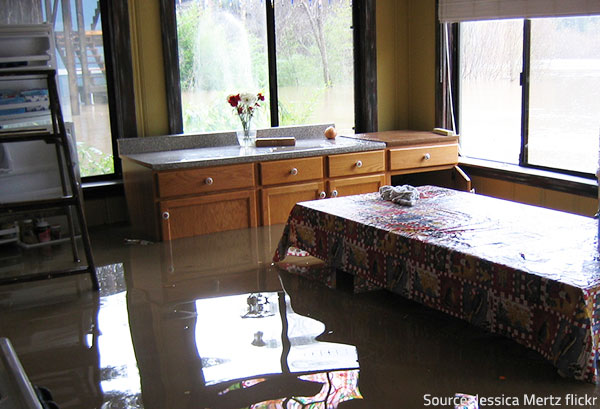
Seeing your home in such a disarray can be really traumatic, but you need to collect yourself and take the right steps to salvage as much of your property as possible.
All these measures are considered emergency repairs and won’t affect the insurance claim process.
Record Proof of Water Damage
Take pictures and videos of your damaged property and preserve any broken parts that may have caused or allowed water damage to take place – this way, you will have indisputable evidence for your insurance claims. Have in mind that nothing should be thrown away and the scene should not be altered (as much as possible) until an adjuster comes to inspect the property.
Review your Insurance Policy
Does homeowners’ insurance cover water damage? It depends on various factors, so you need to find out exactly what your own insurance policy covers. You may or may not have coverage for:
- Floods;
- Sewer or drain backup;
- Accidental water damage from a heating or air conditioning system;
- Mold remediation;
- Restoration of water-damaged furnishings, electronics, and personal items;
- Living expenses if you need to move to temporary lodgings during the repair works; etc.
Review your existing policy with great care to understand all the provisions in it and consult with your insurance agent about adding extra coverage, extending dollar limits, and other relevant issues.
Make a Detailed Inventory of your Damaged Possessions

Your insurance policy will cover most of the costs for restoring your damaged property and your disrupted life.
To get reimbursement for your damaged items, you will need a detailed inventory list stating the make and model number of every piece, its age and current condition, as well as the replacement cost and the actual cash value of individual items. Creating such a comprehensive inventory sheet is quite difficult and time-consuming, but is critical if you want to be paid for water-damaged contents.
Have in mind, though, that the replacement cost is different from the market value of your items. The company will only pay for the estimated cost of repairs, minus depreciation (a decrease in value due to wear and tear or age).
What NOT to Do When Filing Insurance Claim for Water Damage
While all the above steps will help you when filing insurance claim for water damage, certain ill-considered actions may have just the opposite effect. So, be very careful not to:
Throw Anything Away
As already mentioned, you will need evidence for your water damage claims. Your policy states that the damaged property should be available for inspection at any time throughout the claim, so you should not throw away any damaged items until the insurance company has authorized this in writing. If you dispose of your “evidence” too early, you risk having these items denied coverage or not paid for.
You are also advised to keep any receipts, credit card statements, and bank statements concerning your property as they can also help you support your claim and prove the values of your damaged items.
Make Permanent Repairs before You Have Approval from the Insurance Company
Your insurance company will want to inspect your property in order to determine what repairs will be required and how much they are going to cost. If you start reconstruction works before the insurance company has approved them, you may not be paid for the repairs. Large insurance claims always take long to settle and involve a lot of negotiations, so you must be patient and prepared to wait until you are certain that the restoration costs will be duly covered.
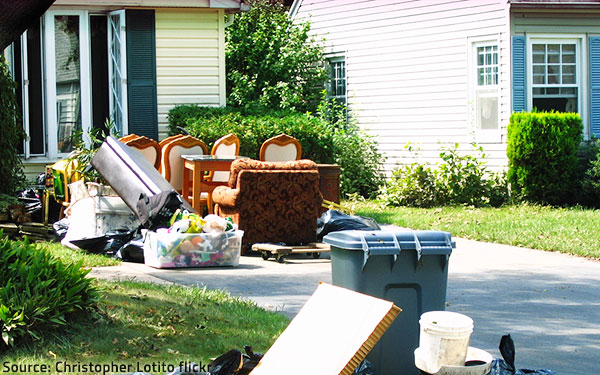
Be careful not to dispose of important evidence before the insurance company has accepted your water damage claim.
However, you can make emergency repairs that are necessary to protect your home from additional damage as already discussed above. Just keep the receipts for any expenses spent on such quick temporary repairs to be able to get your money back later on.
Use the Insurance Company Vendors if You Have Better Options
Your insurance company will give you a list of contractors and cleaning vendors they work with and will encourage you to use their services. Remember that you are not obliged to do so in case you have found a more reliable, more experienced, or better equipped restoration and cleaning company. Research your options, ask for recommendations, get estimates, and talk with your local Better Business Bureau or any of the web based companies who track contractors in order to make an informed decision and hire the professionals who will best suit your needs and requirements.
If you find it to be a more advantageous solution, you can even use the settlement to purchase another property in another location rather than make repairs to the old home. It’s up to you to decide.
Whatever option you go for, insist on having all payments issued to you only, not directly to the contractor you have hired to restore your property. Otherwise, you risk not getting the job done to your liking.
How To File A Water Damage Insurance Claim
As soon as you have reviewed your insurance policy, gathered enough evidence, and created an inventory of your damaged possessions, you need to prepare a written notice to your insurance company to make your official claim. Provide all the relevant information and explain important details at length. It is essential to keep a log that lists all your conversations with the insurance company (including the time, date, name of the person, and what you talked about). Keep copies of letters or other documents you have sent to the company or received from them.
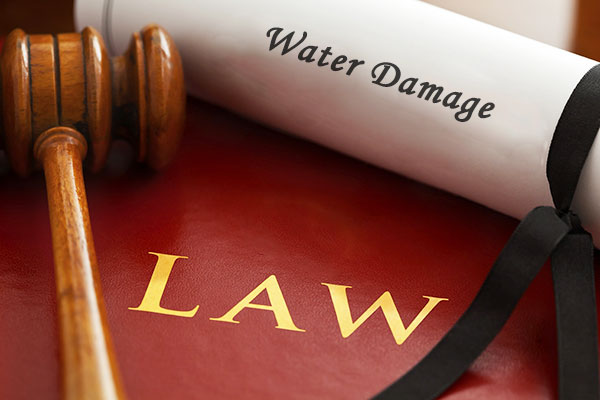
Get familiar with the specifics of the claims process in order to ensure a successful insurance claim.
Here is everything you need to know:
Claims Process
Your insurance company will contact you within a day or two after you have filed your water damage claim. They will explain the process in detail and will inform you of your responsibilities. The company has to start investigating your claim within 15 days after receiving a written notice from you.
When all the required information is gathered, your insurer has 15 business days to accept or reject your claim. If the company agrees to pay your claim, you will receive the money within five business days. If the company rejects your claim, it must explain the reasons why in writing.
Adjusters
The company will send an adjuster to your home to inspect the damage. The adjuster may be a full-time employee of the insurance company, an independent contractor who provides claims services to insurance companies, or a public adjuster who will work for you and will charge you a fee for his/her services (the fee is usually a percentage of the claim and is subtracted from the settlement you receive). If you decide to hire a public adjuster, you have the greatest chance for insurance claim success – the experienced professional will handle all aspects of your claim (assisting with temporary housing, inventorying contents, and providing estimates for the repair works), as well as all negotiations with your insurance company to ensure a smooth and beneficial claims process. Just make sure you are working with a properly licensed adjuster.
Be home when the adjuster comes so that you can answer questions and discuss your options.
Settling the Claim
The company will tell you in writing if your policy covers the sustained damage and will give you an initial estimate (it is not final and may be changed afterwards). You should receive a check from your insurers within five business days (if you don’t get the check on time, call the company to request it and file a complaint if necessary).

You need to comply with the terms and conditions in your insurance policy in order to get your water damage claim accepted.
If you have a replacement cost policy, you will be paid to rebuild or repair your home, based on the current construction costs. You should receive a check for the estimated cost of repairs, minus depreciation and your deductible (the amount of the claim that you’re responsible for paying yourself), no later than five days after the adjuster has inspected the damage to your property. A second check will be issued after the company receives the final bill for the finished restoration works. Have in mind that you must complete repairs or replace your property within a certain number of days from the date of loss.
If your policy provides actual cash value coverage, you will only be reimbursed for the cost of rebuilding or replacing your property minus depreciation (the amount is usually not enough to completely restore severe structural damage). However, you’ll most probably be able to buy an endorsement to increase your coverage.
It is important to know that the insurance company will only pay for household materials of the same kind and quality as the damaged ones. If you choose to upgrade the flooring, the insulation, or anything else in your property you will have to pay the extra costs yourself.
Mold remediation issues
The typical insurance policies don’t cover mold remediation and will pay to remove mold only if it is necessary to repair or replace property that was damaged by a covered peril. Yet, some companies provide a limited amount of mold remediation coverage and others will allow you to buy additional coverage for mold remediation by endorsement.
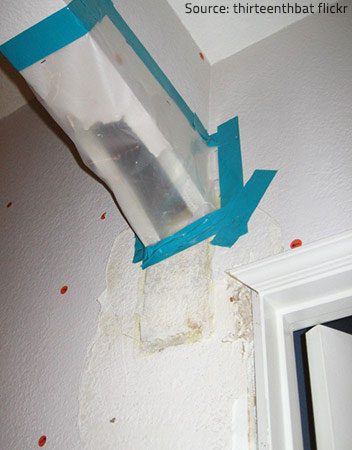
Water damage restoration is very difficult and time-consuming.
Be mindful that mold spreads very quickly and may affect large areas within days. So, it is very important to remove excess water and fully dry all household materials as soon as possible – remove pools of water by mopping or blotting (never use your vacuum cleaner to extract water!), wipe water drops from wood furniture and take wet upholstery and cushions outside (or to a climate-controlled room) to dry, remove area rugs from wet flooring, etc.
Don’t forget to request certificates for repairs and remediation from your hired mold remediator or you may be denied coverage.
Complaints
If your claim has been rejected or if you are not satisfied with the way it is being handled, call your insurance company and try to settle the issue. Many complaints can be resolved by discussing the problems with your insurers. If you can’t reach an agreement though, you have no choice but to file a written complaint with your local department of insurance. Call the Consumer Help Line or visit the website of the insurance department to get more information or to request a complaint form.
Finish the Process
When your insurance company accepts your water damage insurance claim, you need to act fast.
Get Professional Help
Water penetrates all the porous materials in a property and causes severe damage that may become irreversible quite quickly. To prevent great troubles and extensive structural damage, you need to start the remediation process as soon as possible. So, make every effort to speed up the claims process and hire professional help to restore your property immediately after you have come to an agreement with your insurance company. The experienced professionals will extract excess water, completely dry out the premises, repair any sustained structural damage, remove mold, clean the carpets and upholstery, deodorize the area, and restore the good condition of your home in a speedy and efficient manner. When the job is finished and you are satisfied with the work, arrange the payment and send the final bill to your insurance company.
Provide for Temporary Living Accommodations
If your home is badly damaged, you may have to move out while repairs are made. If your insurance policy covers additional living expenses under such circumstances, the insurance company will pay for temporary housing, food, and other essentials. Whenever possible, use vendors or organizations that will bill your insurance company directly (hotels, rental companies, etc.). Write down everything you buy and keep the receipts.

You may need to move to temporary housing while your home is being restored.
Have in mind, though, that some items might not be covered. Find out which expenses will be reimbursed and be careful not to spend too much as your insurer will pay some, but not all of the costs for maintaining your normal standard of living. Additional living expenses will only be covered up to your policy’s dollar limits. If you reach that limit before your home is fully repaired, you will have to pay the rest of the expenses out of your own pocket.
Don’t forget about recurring bills while living in temporary housing, such as rent or mortgage payment, and make sure that they are paid on time.
Once your property has been restored and you have been reimbursed from your insurance, be careful to prevent water damage in the future, so that you don’t have to deal with all the troubles and hassles involved in the claims process and the repair works. If, however, water damage occurs despite the precautions you have taken, call to mind the above tips for filing a water damage insurance claim – they are certain to help you achieve a favorable outcome, however bad the situation.
Comments
By accepting you will be accessing a service provided by a third-party external to https://www.affordablequalityinsurance.net/














